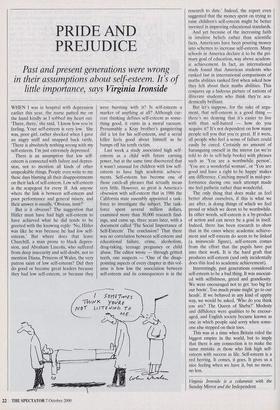PRIDE AND PREJUDICE
Past and present generations were wrong in their assumptions about self-esteem. It's of
little importance, says Virginia Ironside WHEN I was in hospital with depression earlier this year, the nurse patted me on the hand kindly as I sobbed my heart out. `There, there,' she said, 'I know how you're feeling. Your self-esteem is very low.' She was, poor girl, rather shocked when I gave an angry sniff and snapped back tartly. `There is absolutely nothing wrong with my self-esteem. I'm just extremely depressed.'
There is an assumption that low self- esteem is connected with failure and depres- sion, not to mention all kinds of other unspeakable things. People even write to me these days blaming all their disappointments on their lack of self-esteem. Low self-esteem is the scapegoat for every ill. Ask anyone where the link is between self-esteem and poor performance and general misery, and their answer is usually, 'Obvious, innit?'
But is it obvious? The suggestion that Hitler must have had high self-esteem to have achieved what he did tends to be greeted with the knowing reply: `No, Hitler was like he was because he had low self- esteem.' But where does that leave Churchill, a man prone to black depres- sion, and Abraham Lincoln, who suffered from deep insecurity and self-doubt, not to mention Diana, Princess of Wales, the very patron saint of low self-esteem? Did they do good or become great leaders because they had low self-esteem, or because they were bursting with it? Is self-esteem a marker of anything at all? Although cur- rent thinking defines self-esteem as some- thing good, it exists in a moral vacuum. Presumably a Kray brother's gangstering did a lot for his self-esteem, and a serial killer feels good about himself as he bumps off his tenth victim.
Last week a study associated high self- esteem as a child with future earning power, but at the same time discovered that it wasn't unusual for children with low self- esteem to have high academic achieve- ments. Self-esteem has become one of those catch-all phrases that actually mean very little. However, so great is America's obsession with self-esteem that in 1986 the California state assembly appointed a task- force to investigate the subject. The task- force spent several million dollars, examined more than 30,000 research find- ings, and came up, three years later, with a document called 'The Social Importance of Self-Esteem'. The conclusion? That there was no correlation between self-esteem and educational failure, crime, alcoholism, drug-taking, teenage pregnancy or child abuse. The editor wrote — through gritted teeth, one suspects — 'One of the disap- pointing aspects of every chapter in this vol- ume is how low the association between self-esteem and its consequences is in the research to date.' Indeed, the report even suggested that the money spent on trying to raise children's self-esteem might be better invested in improving educational standards.
And yet because of the increasing faith in intuitive beliefs rather than scientific facts, Americans have been pouring money into schemes to increase self-esteem. Many schools in America declare it to be the pri- mary goal of education, way above academ- ic achievement. In fact, an international study found that American students who ranked last in international comparisons of maths abilities ranked first when asked how they felt about their maths abilities. This conjures up a hideous picture of nations of illiterate students who think they're aca- demically brilliant.
But let's suppose, for the sake of argu- ment, that self-esteem is a good thing there's no denying that it's easier to live with than self-hatred — how do you acquire it? It's not dependent on how many people tell you that you're great. If it were, all people who feel a sense of failure could easily be cured. Certainly no amount of haranguing oneself in the mirror (as we're told to do in self-help books) with phrases such as 'You are a worthwhile person', `You are a wonderful woman', or 'You are good and have a right to be happy' makes any difference. Catching myself in mid-per- formance during one such attempt made me feel pathetic rather than wonderful.
The only thing that does make us feel better about ourselves, if this is what we are after, is doing things of which we feel proud or which we deem to be worthwhile. In other words, self-esteem is a by-product of action and can never be a goal in itself. Indeed, there has been research to show that in the cases where academic achieve- ment and self-esteem do seem to be linked (a minuscule figure), self-esteem comes from the effort that the pupils have put into their work. It is the hard graft that produces self-esteem (and only incidentally does this lead to academic achievement).
Interestingly, past generations considered self-esteem to be a bad thing. It was associat- ed with selfishness, greed and grandiosity. We were encouraged not to get 'too big for our boots'. Too much praise might 'go to our heads'. If we behaved in any kind of uppity way, we would be asked, 'Who do you think you are? The Queen of Sheba?' Modesty and diffidence were qualities to be encour- aged, and English society became known as one in which people said sorry when some- one else stepped on their toes.
This was at a time when Britain ruled the biggest empire in the world, but to imply that there is any connection is to make the same mistake as those who link high self- esteem with success in life. Self-esteem is a red herring. It comes, it goes. It gives us a nice feeling when we have it, but no more, no less.
Virginia Ironside is a columnist with the Sunday Mirror and the Independent.


















































































 Previous page
Previous page